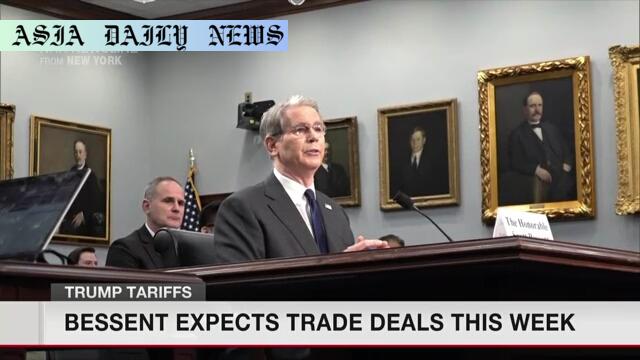Trade Deals: US Treasury Secretary Scott Bessent reveals significant progress in trade negotiations and hints at upcoming deals.
Trade Deals: US Treasury Secretary Scott Bessent predicts new trade agreements.
Bessent discusses active negotiations with 17 trading partners.
President Trump optimistic about future discussions with China.

Progress in Global Trade Agreements
The United States is on the verge of securing significant trade agreements that may profoundly reshape its economic relationships globally. US Treasury Secretary Scott Bessent disclosed during his recent testimony to the House Committee that discussions have progressed with 17 major trading partners, including Japan. He hinted that some trade deals may be announced as early as this week, marking a monumental step forward in US trade policy.
Bessent emphasized the importance of these deals in reducing tariffs, dismantling non-tariff barriers, curbing potential currency manipulation, and minimizing unfair subsidies. These measures, he explained, would elevate transparency, boost US exports, and create a more balanced playing field across global markets. His optimistic forecast suggests that the United States is working diligently to achieve agreements with the majority of its trading partners by year-end. However, despite robust negotiations, he clarified the United States had yet to engage with China on this front.
Trade Talks with China: Optimism and Opportunities
While Bessent remained cautious about China, President Donald Trump offered a more optimistic outlook by hinting at potential future discussions with Beijing. According to Trump, initial signals from China indicate a willingness to engage in trade talks at the ‘right time,’ a sentiment that could pave the way for revived economic collaborations in the future. This statement aligns with efforts by the Treasury Secretary and Trade Representative Jamieson Greer, who are reportedly meeting with Chinese counterparts in Switzerland this very week to tackle pressing economic and trade-related issues.
The prospect of renewed collaboration with China holds substantial economic and geopolitical implications. A bilateral agreement with Beijing could not only enhance trade flows but also reduce tensions that have stemmed from tariff impositions and policy disagreements. This potential development will undeniably remain a focal point in international trade news, and could signal a turning point in US-China relations.
Challenges and the Future of US Trade Policy
As the United States accelerates its trade negotiations, several challenges remain on the horizon. Key among them are addressing global criticism regarding the US administration’s approach to tariffs and ensuring equitable deals that benefit both American and foreign stakeholders. International scrutiny persists over how these agreements will address complex issues like intellectual property protection, fair labor practices, and long-term environmental impacts.
However, the US administration appears committed to a rigorous, transparent, and fair approach to trade. This includes negotiating with partners who bring compliant and mutually beneficial proposals to the table. Secretary Bessent’s testimony indicates a renewed era of focus and determination within the White House to establish a trade framework that benefits American businesses and workers alike.
In conclusion, while challenges may persist, the expected announcement of new trade deals signals a significant leap forward in US global economic strategy. It highlights the immense potential of diplomacy, negotiation, and forward-looking economic planning in achieving tangible progress in international trade.



Commentary
The Importance of Trade Modernization
The world economy has experienced rapid globalization in recent decades, making trade a cornerstone of economic growth. Thus, the importance of modernizing trade agreements cannot be overstated. The United States, with its vast economic influence, is taking commendable strides in renegotiating these agreements to suit the complexities of the modern global economy.
As Scott Bessent indicated, reducing tariffs and dismantling non-tariff barriers will likely provide US businesses greater access to international markets. This, in turn, can unlock significant economic growth and provide a boost to industries reliant on exports. Moreover, addressing concerns such as currency manipulation and subsidies is critical in fostering fairness. These measures reflect a robust intention to level the global playing field while safeguarding American economic interests.
The US-China Trade Dynamic
One of the most intriguing elements of this news is the possibility of renewed trade talks with China. The trade relationship between Washington and Beijing has been fraught with challenges and complexities. From intellectual property disputes to tariff battles, the journey has been tumultuous. Yet, dialogue remains essential. A willingness from both parties to find a solution could yield tremendous benefits. It is encouraging to hear that preliminary meetings with Chinese officials are scheduled, as these are steps toward bridging gaps and creating a more cooperative economic partnership.
What Lies Ahead
The roadmap to successful trade agreements is undoubtedly fraught with hurdles, including political differences, public skepticism, or even opposition from vested interest groups. However, the diligent efforts made by the US Treasury will likely set the stage for new economic alliances, greater foreign investment, and healthier trade balances. These agreements may also shift the tone of trade relations in a way that encourages global trust and economic interdependence.
In providing this outlook, Americans should remain cautiously optimistic as the administration works to ensure that these agreements cater to both short-term economic improvement and long-term sustainable growth.